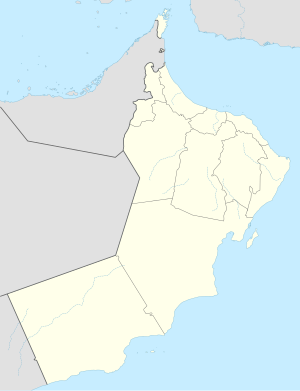Nakhal
This article needs additional citations for verification. (March 2019) |
Nakhal
نَخل (in Arabic) | |
|---|---|
Town | |
 View of the town from Nakhal Fort, with Al Hajar Mountains in the background | |
| Coordinates: 23°23′N 57°49′E / 23.383°N 57.817°E | |
| Country | |
| Region | Al Batinah Region |
| Governorate | Al-Batinah South |
| Population (2020)[1] | |
| • Total | 28,088 |
| Time zone | UTC+4 (+4) |
Nakhal (Arabic: نَخَل) or Nakhl (Arabic: نَخْل) is a wilayah in Al Batinah South Governorate in Oman. It is home to many old castles and forts, including the pre-7th century Nakhal Fort.[2]
Nakhal stand out with its fortress perched on a mountainous hill amidst a cluster of date palms, embodying a historical presence dating back to pre-Islamic times. Ain Al-Thawara being one of the hot springs gushes from Mount Sald adds to the natural features that distinguish the Wilayat Nakhal. The village of Wakan witnesses the phenomenon of apricot blossoms in the spring season, attracting tourists and visitors.[3] In the Wilayat Nakhal, there is also the Ramlat Khabat Al-Ja'adan, and the "Rimal Park" project won the competition for the best development project in the contest announced by the Ministry of Housing and Urban Planning, competing with various governorates of the Sultanate of Oman.
Nakhal Fort
[edit]Nakhal, Oman, is renowned for its historic Nakhal Fort, also known as Qal'at Nakhal or Husn Al Heem. Nakhal Fort is one of the most iconic and well-preserved forts in the country, situated on a rocky prominence overlooking the surrounding landscape. Here is some information about Nakhal Fort:
- Architecture and Design:
- Nakhal Fort exhibits classic Omani architectural features, characterized by its robust walls and towering turrets.
- The fort is strategically positioned to overlook the Nakhal oasis and the adjacent date palm plantations.[4]
- History:
- The exact date of construction of Nakhal Fort is uncertain, but it is believed to have origins dating back to pre-Islamic times.
- The fort has undergone numerous renovations and expansions over the centuries, with the present structure largely reflecting its 17th-century design.[4]
- Purpose:
- Like many forts in Oman, Nakhal Fort served both military and residential purposes. It acted as a stronghold for defense against external threats and also housed the local governor.
- Interior Features:
- Nakhal Fort's interior consists of multiple rooms and chambers, each serving specific functions.
- Visitors can explore various areas, including a tower with panoramic views, living quarters, storage rooms, and a mosque.
- Surroundings:
- The fort is surrounded by a date palm oasis, providing a picturesque setting that contrasts with the rugged mountainous terrain.
- The hot springs of Ain Al Thawara are nearby, adding to the natural attractions in the area.
- Visitor Experience:
- Nakhal Fort is open to the public, allowing visitors to explore its corridors, climb its towers, and enjoy the scenic views.
- The fort provides insights into Omani history, architecture, and military strategies.
- Events and Festivals:
- Occasionally, Nakhal Fort hosts cultural events and festivals that showcase Omani traditions, arts, and crafts.[4]
Notable people
[edit]- Abdullah Al Hilali, international football referee.
References
[edit]- ^ "Population - DATA PORTAL". National Centre for Statistics & Information. Retrieved 2021-10-15.
- ^ "Living Landscapes of Oman: Fourth International Conference Responsible Tourism ..." Sultanate of Oman. Archived from the original on 27 September 2013. Retrieved 24 September 2013.
- ^ "We Love Oman: Beckoning the season of apricots in Oman". Times of Oman. 21 March 2023. Retrieved 27 December 2023.
- ^ a b c "This Spectacular Omani Fortress Pre-Dates the Islamic Era". Atlas Obscura. Retrieved 2024-08-15.
